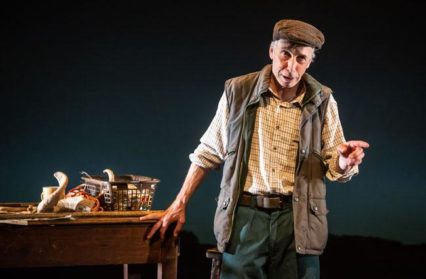Margot Morgan reviews the latest monologue from National Theatre Wales, The Stick Maker Tales, at the Taliesin Arts Centre in Swansea, during its national tour.
Any monologue performance demands myriad challenges of an actor, not least to keep the audience engaged, and in National Theatre of Wales’ The Stick Maker Tales, Llion Williams did so for well over an hour, without interval. Williams, an award-winning Welsh actor with a vibrant theatre and television career, successfully inhabits the life of isolated Welsh hill farmer Geth Roberts at Taliesin Arts Centre. The choice of the director, Kully Thiarai (the Artistic Director of National Theatre Wales), to have the farmer sit often and address the audience made it feel almost as though we were sharing the fireside with him.
Penned by prestigious playwright Peter Cox, the tales reveal the lives of the shepherd and his family. There would seem to be scant opportunity to find humour or wonder in a script about a lonely farmer whose failing sight jeopardises his existence, along with that of his livestock, beloved dogs and farm, but award-winning Cox provides both. There were evocations of the bleak beauty of winter and of the Milky Way seen undimmed by urban light. The shepherd’s entreaty to the ‘sheep worn blackest of blanket bog’ to ‘watch over’ him, brings to mind momentarily the Reverend Eli Jenkins’ prayer in Dylan Thomas’ Under Milkwood, but the comparison ends there.
Deliciously horrific descriptions are shared conspiratorially as the farmer takes us back to his childhood, awestruck by what he saw of the illnesses that took the lives of family and friends. His grandfather, stricken by lockjaw brought on as he sliced into his own leg while tagging lambs, stiffens and glowers speechless in the shed before dying, and a neighbour’s child swells like a maggot with yellow fever. Later in years he describes worriedly how a waterborne virus threatened to take the life of his nephew, who was ‘like a son to him’. He and his twin are his mother’s ‘lambs’, both bathed at birth in the family’s china bowl and wrapped ‘in a bit ‘o best’, but the stillborn twin was explained away with farmerish realism as ‘a life not viable’, much to his brother’s ongoing disbelief, and was buried on the farm.
We are reminded often throughout the work that life without our National Health Service was ruthlessly unforgiving (and this play originally served as part of NTW’s NHS70 programme in July 2018); indeed the farmer’s very life is dependent on the free treatment that he is surprised to receive for his eyes.
Director Thiarai and the creative team have established a set that would be viable in non-theatrical spaces, at its heart a Welsh farm kitchen with slate floor, ringed with the sticks of elm employed by the stick maker at his trade. A fringe of soil completes the sense of a home at the centre of a muddy farmyard. Props connect the audience to the life of the farmhouse: the china bowl reminiscent of the Welsh myth of the cauldron of rebirth is recast in this harsh environment, string in a drawer, kindling wrapped in newspaper, the minutiae of survival along with treasured letters and photos kept in a tin box, all are present in this living kitchen.
The backdrop revealed at times a line of slate reminiscent of a Kyffin Williams painting. Milky white light pierced from the sides of the stage, or closed down the rear panel mimicking the terrifying effect of cataracts on the shepherd’s vision. This lighting was used with sound effects, sometimes of the farmer’s world, sometimes reminiscent of John Cale’s early sound experiments, acting as breaks between the tales.
The Stick Maker Tales is quietly political in its insistence on the importance of our NHS and in its celebration of Welsh farming, it also pays tribute to the cultural heritage of Wales through its artistic references. Somehow it offers a sense of continuity and solidity in the face of rapid change. The digital world has little impact on a mud-soaked field or a ‘yow’ (ewe) giving birth, and the environment evoked here slows the world. At a time when we have identified loneliness as one of the greatest threats to our mental health, and when there is a rise in the incidence of suicide amongst farmers in Wales, this play brings to life the struggles faced by our rural communities.
You might also like…
Lynda Nash attends a performance of The Newport Monologues, a play in collaboration with Feel Good Newport and The Riverfront, Newport.
For more Wales Arts Review coverage of National Theatre Wales, including news, reviews, and interviews, click here.












